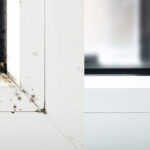Windows serve as more than mere sheets of glass providing views of the outside world. They play a crucial role in safeguarding the interior of a house from various elements. Despite their significance, they are often overlooked as one of the most beneficial features of a home.
Here are five things to look for when deciding to replace:
#1 Damaged
The presence of damage is a clear indication for replacement. Cracked windows allow air to seep through, compromising durability and longevity. This can lead to problems like mold growth, pest infestations, water damage and increased vulnerability to break-ins.

#2 Drafty Windows
With proper care and maintenance, they can last up to 20 years. However, several factors can affect their longevity. By understanding the signs of window damage, homeowners can take preventive measures to avoid issues like pests, water damage, and compromised residential safety.
Cold drafts or wind entering the house suggest drafty windows. Gaps often develop around older windows, allowing air and pests like ants, stink bugs and flies to infiltrate the home.
#3 High electric bills
A surge in electricity costs is a common sign that they need replacement. Inefficient temperature regulation due to aging, can cause energy bills to skyrocket. Installing new windows enhances energy efficiency and optimizes electricity usage.
#4 Condensation
When window seals are damaged, condensation forms on the inside. This not only allows air leakage but also increases humidity within the house. Replacing or repairing the seals can prevent condensation from affecting the interior.
#5 Location
The placement of windows influences their longevity. Direct sunlight and exposure to harsh weather conditions like rain or hail can weaken the glass, making it more susceptible to damage. Skylights, situated on the roof, are particularly vulnerable due to constant sunlight exposure and climate variations.
Windows, like other building materials, have a finite lifespan. However, with proper care, they can last up to 20 years. Therefore, you should promptly address issues like damage, high energy bills and condensation to ensure the safety and quality of your home.
Neglected or broken windows can lead to further destruction, including pest infestations, water damage and mold growth. By being aware of the condition of your them, you can take timely action to replace them when necessary. Check out energy efficiency in windows here!







